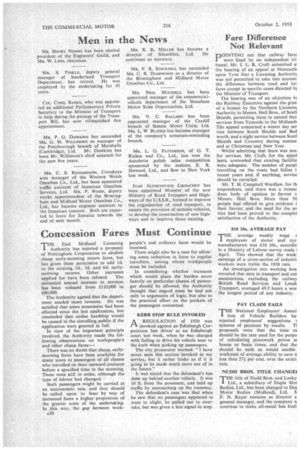Concession Fares Must Continue
Page 32

If you've noticed an error in this article please click here to report it so we can fix it.
THE East Midland Licensing Authority has rejected a proposal of Nottingham Corporation to abolish cheap early-morning return fares, but has given them permission to add Id. to the existing 3d., 5d. and 6d. earlymorning returns. Other increases applied for have been refused. The estimated annual increase in revenue has been reduced from £110,000 to E80,000.
The Authority agreed that the department needed more revenue. He was satisfied that some economies had been effected since the last application, but concluded that undue hardship would be caused to the travelling public if the application were granted in full.
In view of the important principle involved, the Authority made the following observations on workpeople's and other cheap fares:—
There was no doubt that cheap, earlymorning fares have been available for many years to passengers of all classes who travelled on their outward journeys before a specified time in the morning. These were still in order, although the type of labour had changed.
Such passengers might be carried at an uneconomic rate, and they should be called upon to bear by way of increased fares a higher proportion of the greater costs of the undertaking. In this way, the gap between work a30 people's and ordinary fares would be lessened.
There might also be a case for allowing some reduction in fares to regular travellers, among whom workpeople must be included.
In considering whether increases which would place the burden more heavily on particular classes of passenger should be allowed, the Authority thought that regard must be had not only to arguments of logic, but also to the practical effect on the pockets of the passengers concerned.
KERB STOP RULE INVOKED
A REGULATION of 1920 was invoked against an Edinburgh Corporation bus driver at an Edinburgh court last week, when he was charged with failing to drive his vehicle near to the kerb when picking up passengers. The city prosecutor warned: " I have never seen this section invoked• in my service, but it rather looks as if it is going to be made much more use of in the future."
It was stated that the defendant's bus drew up behind another vehicle. It was 10 ft. from the pavement, and held up traffic by encroaching on the tramway.
The defendant's case was that when he saw that no passengers appeared to want to alight, he pulled out to overtake, but was given a late signal to stop.




























































































